
A Dark Backstory Movie, With A Gruesome Duration Length…
Satou Takeru reprises his role once more as the redeemed former-warrior Himura Kenshin, only this time stepping back in time with the events of his past when he went under the alias Battousai. The storyline flitters between the " impending threat" ( though in typical Kenshin fashion, a villain who rarely escapes the realm of memorability after the movie) weapons dealer Yukishiro Enishi ( Araki Towa) as well as Kenshin’s relationship with Yukishiro Tomoe ( Arimura Kasumi).
The biggest thing to say about ‘ Rurouni Kenshin: The Beginning’ is that it is arguably more profound and violent than previous Kenshin movies. A particular gruesome scene appears on screen as a man writhes in agony with blood spurting out of his wounds and mouth, whilst the cinematography combines between moody and epic battle scenes, the vivid hues of festivals and the mundane and dull palettes of everyday life in Japan .This is no surprise considering the nature of the themes of assassins, fights and mercenaries found throughout the story but screenwriter Otomo Keishi purposely sets a vast shift and darker tone from previous movies throughout the storyline. Satou Takeru is brilliant as our main lead, adding a notable more stoic, hostile and mysterious ambience as the antihero of the movie rather than the beloved hero we have come to know in earlier ones. En par with Takeru was undeniably Arimura Kasumi as the suave and gradual love interest of Kenshin, Yukishiro Tomoe. The chemistry between the leads was evidently slow-burning and not your typical status quo romance( especially from what viewers can remember from the events of ‘ Rurouni Kenshin: The Final’ and the conclusion of the movie ) , but dynamic , heartbreaking and undeniably the intriguing highlight of the entire film.
On the other hand the storyline isn’t without its more sound flaws. Whilst Araki Towa is a brilliant actor, his onscreen persona as antagonistic weapons dealer Enishi is unimpressive and lacklustre to say the least. The plot threat of Einishi certainly keeps the plot moving, but his actual appearance and memorability do not quite reach their full potential. Adding on top of the trickier issues of the film production was the gruelling duration length of 2 hours 18 minutes which can slowly trial even the most patient viewers’ attention span.
On a more nuanced note it seemed an odd move by screenwriter Otomo Keishi to have released ‘ Rurouni Kenshin: The Final’ before the events of ‘ Rurouni Kenshin: The Beginning’. Whilst the movie does help to foreground a lot of the events from the previous storyline in more vivid detail (and understand more about Kenshin’s past), it would’ve seemed arguably a sounder move to have released this prequel movie first in order for viewers to grow sentimentality towards Kenshin and understand the greater impact of the events of the final movie. ( Therefore I’d recommend to newcomers or those still waiting to watch ‘ Rurouni Kenshin: The Final’ , to first complete ‘ Rurouni Kenshin: The Beginning ’ in order to understand the events of the former.) However, the finale of the film did deliver a beautiful shot of cinematography which stuns viewers with the shocking revelations and events to follow.
To conclude ‘ Rurouni Kenshin: The Beginning’ delved into the backstory of the beloved hero from the previous films with finesse and darker violence. The movie sometimes failed to reach its full potential or facilitate its antagonist towards being nothing more than a quick plot device and its tedious duration length , but the delivered performances by Takeru and Arimura, the stunningly filmed scenes and pretty much all of the performances by the main cast were well-deserved treats for viewers
Was this review helpful to you?
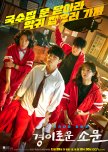
An “ Uncanny” Tale of Family , Friendship and The Supernatural...
Looking back retrospectively , Uncanny Counter has an undeniable amount of character progression since episode 1 for our main high-schooler hero Mun( Jo Byung Koo) as well as his fellow counters Mo Tak ( Yoo Joon Sang), Ha Na ( Kim Se Jeong) and of course Chu Mae Ok ( Yeom Hye Ran), yet, it’s crucial not to sugarcoat the fact that at times , the storyline felt a little inconsistent and slow- paced ( especially by the second-half )as well.
Of course it’s wrong to say that the scriptwriting was dire, as the story and characters were fairly well-written. Thanks to the collaboration of screenwriters Jung Do Yoon ( Witch’s Court, The Time We Were Not In Love), Yeo Ji Na ( Il Mare) and Kim Sae Bom ( Hello Schoolgirl), the wonderful talents of the cast and director Yoo Seon Dong ( respectively who has also worked as a screenwriter on productions such as Shoot My Heart),the show was interwoven with enough action and fights in episodes without falling down the trap of becoming a mindless and dull action show.
Uncanny Counter had an evident story plot with the Counters chasing after the “ big bad” antagonist of the series from episode 1, as well as learning more about themselves through becoming a surrogate family for one another in the process. This was an undeniably sweet progression for our characters , however , there was a little bit of repetitiveness before the half-way mark with the typical episode progression of the counters chasing after a / the “ big bad” spirit , a conflict or event gone wrong and one of the main characters beginning to doubt their abilities or recollection of events ( particularly for Mun).
As a consequence the show sometimes felt a little lagging in the second-half, consequently meaning that there were some undeniably inconsistent moments for our heroes as well as deeper questions about the other-side. Just some of these include; Mun’s presumable absences at school ( during certain missions) not being raised or alerted , Mo Tak’s slightly lacklustre reactions towards certain events in the storyline, the fate of Ha Na’s family ( and considering the final ending, if she could’ve have been granted the same wish) , the relationship between Mae Ok and her husband as well as questions about the other side( not least what happens to the guides when their Counter fades, who controls the guardians and what happens to the spirits of the Counters). Whilst some of these point are mainly minor , they do point out some slightly loose ties within the overall story arch.
Overall although not a flawless production ,Uncanny Counter was a good drama and its success has certainly been sealed by the unusual decision ( especially for OCN) to bring out a second season
Was this review helpful to you?

A Worthwhile Adaptation…
Adapting a popular manga and anime series to a live-action movie can be a case of trial and error with attempting to appease newcomers and fans alike rarely ending in overall success. Nevertheless Tsutomu Hanabusa and Izumi Takahashi decided to take on the challenge of mangaka Ken Wakui’s popular series ‘ Tokyo Revengers’ to the big-screen with an adrenal-infused movie that delivered all of the franchise’s punches and blows.
Akin to its original source material the movie focused upon deadbeat " loser" Takemichi Hanagaki ( Takumi Kitamura). At twenty -six years old and stuck in a job that he absolutely loathes with the passion , Hanagaki soon comes to the conclusion that he’s reached a stalemate with life-given opportunities . However fate has other plan for the unlikely hero.
Hanagaki stumbles upon the revealed truth that his ex-girlfriend Tachibana Hinata ( Mio Imada) perished at the hand of the notorious Tokyo Manji Gang. When Hanagaki is given a golden-opportunity to travel back in time to save his former-girlfriend from her violent death, Hanagaki becomes determined to do whatever it takes to save Hinata. The " crybaby hero" is forced to befriend the Manji group’s unlikely leader Mikey"( Yoshizawa Rio), and his right-hand man " Draken" ( Yamada Yuki) as he attempts to infiltrate the gang and prevent domino- effect -events from occurring through his timeline. However as Takemichi works together with Hinata’s younger brother and detective Tachibana Naoto ( Sugino Yosuke),Takemichi’s life begins to diverge in new directions as he dives deeper into the underworld of delinquents…
Tokyo Revengers’ has always had a “ love-hate” relationship with fans and enthusiasts alike. Whilst many have praised mangaka Ken Wakui’s popular series for its intriguing setup and characters, the series has always hit a rut with audiences over two notable flaws : the believability of its ensemble of teen characters actually acting and being their age, as well as the plot holes and loops which remain greatly prominent in the manga writer’s well-known work. In many ways Takahashi and Hanabusa are subtly decisive within the included elements in their adapted live-action movie.
Of course the director and screenwriter are careful not to stray too far away from the source material. On the other hand subtle changes can become prominent to audiences through certain directions of the storyline and especially with consideration to the age of the characters. Takahashi presented the characters as slightly older than their original counterparts; arguably resonating with audiences by the complex journey of adolescence reflected through the allegorical harshness of reality and experiences onscreen.
Paired together with Takahashi’s kaleidoscope of eclectic genres from mystery to action and then romance, there’ s a gritty-edge to Hanabusa’s focus upon fight scenes which add a notable focus upon violence throughout the movie.
Although silly and lighthearted gags transcended onto the big-screen from Wakui’s manga in order to lighten up heavy-angst and fist fights, Hanabusa downplayed comic relief a lot in his adaptation. Instead the movie’s pacing could feel heavily impacted by the blows and fists of its onscreen characters. The elements of comedy which heavily dominated Wakui’s work against darker panels were sparingly dispersed throughout the film; necessary padding at times but gradually beginning to unravel the storyline’s loose-ends.
As the film’s narrative progressed it became evident to audiences that there was an evident disparity in fight scenes. Arguably Hanabusa’s defence against main lead Takemichi Hanagaki being a visible weakling who is often beat up is excusable to a certain extent as he’d rarely escape from a fight or brawl scene unmarked. Nevertheless there was an unintentional farcical element as the storyline progressed with the contrast between realistic physical strength amongst those engaged in the action soon growing clearly visible for audiences.
Of course Hanabusa wasn’t entirely devoid of coherency when attempting to film the fight scenes of the movie. Together with the help of Tomo Ezaki , there was something surprisingly pacy about stunning visuals coinciding against emotional punches especially as the climax began to arise. However the movie’s climax did help to mark drawing up the fight for audiences, the delivered result of aesthetic and visual brawl sequences could often feel like a coated exterior to draw attention away from the anticlimactic buildup of initial events and the delivered result.
Another element of the movie which arguably suffered under the restraints of pacing was the romantic relationship between Hinata and Takemichi. It is arguable that Hanabusa did not entirely abandon the onscreen relationship between the main lead and his former-girlfriend as this did arguably remain one of the greatest-driving forces for the storyline and Takemichi’s personal goals. On the other hand it could often feel as though Hanabusa used the romantic element of ‘ Tokyo Revengers’ as merely padding once again again the violence of the series; necessary for framing the storyline and plot-drive but rarely shaping out the relationship and complexities for Hinata and Takemichi with more definitive edges.
Then of course there’s the discussion surrounding the casting choices of our main leads. Whilst there were admittedly a few scenes where audiences had to power through certain wooden line deliverances, it’s undeniable that Kitamura is brilliant as Takemichi. The actor managed to bring out the awkward charm of Hanagaki’s adult-self navigating his past against his rekindled courage and determinism which gradually awakens through Kitamura’s subtle yet profound micro-expressions and intonations. Costarring with Kitamura are Ryo Yoshizawa as Mikey and Yuki Yamada as Draken are astounding in their roles by adding an idiosyncratic ambience to their onscreen personas that is both heartwarming and threatening.
Then there’s Mio Imada as Takemichi’s former-lover. Whilst Imada’s screen time is restricted due to her character’s limited scream appears des , her performance did offer a level of sweet and dynamic charm to her embodied role as Hinata and carried through with natural chemistry towards her costar Kitamura.
The vision of Hanabusa’s work was aesthetic for audiences but admittedly without a few flaws. Exploration into Takemichi’s reasons for time-travelling and the handshake being the ultimatum are left hanging the air in the movie’s tight-paced storyline. Additionally there were often few transgressions ( aside from haircuts and technology) made between the past and present eras for the audience. Whilst it would’ve been ridiculous for the series to have nuanced each time-leap in depth there were certainly a multitude of missed-out opportunities to explore a manipulation of cinematography. This could’ve easily been done in order to highlight a greater sense of pathos and nostalgia by Takemichi as an adult experiencing his youth once more. Despite this the ending delivered audiences with a fairly satisfying and outcome to the events of the movie.
Hanabusa and Takahashi’s adapted live-action movie was an evident challenge from the outset. Whilst the movie is evidently limited to a certain extent carried on by noted flaws from Wakui’s work as well as the director and screenwriter’s own directions having their strengths and limits. Nevertheless ‘ Tokyo Revengers’ was a fairly satisfying and adrenal-ride; pacy at times and slightly tedious in other parts, but engaging and intriguing through its cast and setup tone by Hanabusa and Takahashi.
Was this review helpful to you?

A Good Side-Story…
We’ve all been there . The show or production which won our hearts, ignites intensified hope over news of a sequel or spin-off in the making, hype is sparked online and by word of mouth and then when we act will then receive the actual final product, it is often with mixed-results.
‘ Ashin: Kingdom Of The North’ could’ve easily gone in either of these directions. An official spin-off by original director Kim Sung Hoon and screenwriter Kim Eun Hee of the hit zombie period-series ‘ Kingdom’, ‘ Ashin: Kingdom Of The North’ had a lot of excitement and worry by watchers around the delivered result of a whole production focusing on a side character only shown briefly at the end of the second season.
As a character, the special is quick to cut short to the chase about her past without feeling disregarded or predominating screen time. The daughter of a secret spy who is devoted to Joseon in a border village, Ashin’s revenge becomes more prominent as the story plays out and takes her down many wrong paths. It was intriguing to see how the production could balance out between actually developing Ashin as more than a one-dimensional shell, by duelling this onscreen tale with the threat of the zombie outbreak beginning to take root. Yet viewers should not worry as the production balances out the two storylines as two sides of the same coin; different, yet helping to interchangeably motivate the events of one another as the production progresses.
As this was shown from Ashin’s view of the world at times, it was intriguing to wonder whether any original characters from ‘ Kingdom’ would pop up in the storyline. Sure enough, actor Park Byung Eun took a fairly central role again as Min Chi Rok, the heroic inspector general from the main storyline of ‘ Kingdom’. Intriguingly unlike in ‘ Kingdom’ and as prior events to the main storyline it was fairly astounding to see Chi Rok in a more antagonistic light. Whilst ‘ Ashin: Kingdom of North’ was merely the necessary foreground in order to establish the titular character properly before later seasons and there is still a lot of potential with understanding Chi Rok’s motives, it would have been equally interesting to invested a little bit of side time here within understanding Chi Rok’s shift from villainous to righteousness between the two storylines.
Of course any critique of this production would not be complete without mentioning the brilliance of Jun Ji Hyun as Ashin, as well of course younger actress Kim Shi Ah as Ashin’s younger-self. However , Ashin's character in this special episode doesn’t have a lot of dialogue opportunities. It is understandable this is meant to reflect Ashin’s sense of character, and Ji Hyun is really good with the source material ( even without as many speaking opportunities), but this is certainly a more critical point to note.
‘ Ashin; Kingdom Of The North’ was an outstanding move by the director and screenwriter to establish and bring to life Ashin as an individual in her own right, without straying away from the violent, historical or political undertones of past seasons. Although the storyline sometimes wobbled underneath the problem of with scenes over the long duration time, drawing away from the more thrilling adrenaline-infused rush of action shots, the screenwriter was by no means a mess. The special intensifies the warring troubles of political instability amongst the people, a spine-tingling soundtrack accompanied by beautiful cinematography, historically accurate onscreen costumes and dialogue that is further captivated by the brilliant performances of the main cast. A good watch.
Was this review helpful to you?
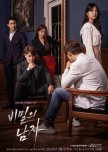
A Laughable and a Hare-Brained Makjang...
“A Man in a veil” is the epitome of the infamously coined “ Makjang” by South-Koreans ( used to describe plot concepts which are equivalent to the reputation of telenovelas - so ridiculous, cliche and unrealistic that they often fall into the “ so bad, it’s good” category). From ‘ pseudoscience’, ‘ revenge’ to ‘ lost family’ cliches, “ A Man in a veil” throws in all the towels to be a ridiculous hundred and five-episode extravaganza of wooden acting , fairly one-dimensional characters and tropes.“ A Man in a Veil ” takes on the typical revenge cliche of a man with an intellectual disability called Tae Poong ( Kang Eun Tak) whose destiny is gradually torn apart by two sisters; the intrinsically “selfish” Yu Ra ( Lee Chae Young) who begins to manipulate and blackmail him throughout the series, and the “ kind-hearted” sister Yu Jung ( Uhm Hyun Kyung) who holds strong feelings towards him. His life changes forever, however, when a tragedy causes a second chance for Tae Poong to extract his revenge on everyone who has wronged him.
Whilst the revenge cliche was possibly the most intriguing of the show, “ A Man in a Veil” didn’t truly use this to either flesh-out nor deepen the characters, with Tae Poong often feeling more like a “ stock male lead” with little interest for viewers or emotional depth behind his actions. ( Apart from Eun Tak’s random screaming matches and “pained “ facial expressions when it was necessary for the “ plot”). Arguably, Yu Jung did have a little more depth than Tae Poong, due to her complicated feelings for both him and the second male lead Seo Jun ( Lee Shi Kang), her later tragedy and motivation towards getting back at her sister and a family revelation as well. On the other hand, considering the emotional and traumatic depth in reality towards this tragic event which took place in the series, Yu Jung not mentioning this again after it was necessary for the “ story” felt both lacklustre and poorly- written in the grand scheme of character- writing.
Ironically , one of the worst-written characters in the show must go towards Yu Ra as both an individual and an antagonist . It was evident from the get-go that screenwriter Lee Jung Dae wasn’t attending to make Yu Ra a “ sympathetic villain”” - she’s inherently a selfish and despicable character who later becomes deluded by her own abilities to outwit others. On the other hand, it’s hard to really understand what makes Yu Ra actually tick or the actual motives behind her thoughts, apart from not wanting to “ be in poverty” and “ survive”. To make matters worse, we very rarely got to see Yu Ra as an actual human being. The several moments which could have offered genuine intrigue into Yu Ra as a character ( such as her past and later events) were entirely written-off to make Yu Ra’s schemes more and more unbelievably ridiculous by each episode. ( Counterpart to the other antagonistic character played by Kim Hee Jung as Joo Hwa Yeon.)
This certainly leads the storyline to take on a dragging and lacklustre focus between the three primary storylines; Tae Poong and his revenge, Yu Ra’s attempt to climb-up the social ladder and the dirty secrets of their associates ( including Yu Jung and Yu Ra’s parents as well as Seo Jun’s mother and father). Whilst arguably each storyline did have some attraction in how they played out, before even the halfway point, the show began to draw itself too much away from the main protagonist’s own ventures into other characters’ lacklustre storylines, which took away many of the twists which were supposed to be “ emotional” and “ shocking” for viewers with little delivering impact for viewers .
Consequently the plot inconsistencies of the show were beyond incoherent - CCTV cameras, criminal investigations and actual forensics are nonexistent , the characters are ridiculously dumb enough to make the same mistakes over and over in favour of “ plot motivation” and later “relevant twists” completely contradict earlier statements made in the show.
Perhaps it is due to the fact that the show is so detached from coherent plot line , or, the fact that the stylist’s choices are so outdated ( including product placement) helps the show to seem older , but, “A Man In A Veil” is a perfect example of a show more than a decade behind recent trends - the characters have no depth or actual intrigue for viewers , the storyline is filled to the brim with more and more ridiculous cliches, and even the ending felt a little lacklustre. ( In particular after building more than 80 episodes of Tae Poong seeking revenge only to be “ miraculously solved” with little sense of conflict or poetic justice for our main lead . )It’s fair to say that “ A Man in a veil” is a typical makjang- certainly not worth watching if you’re looking for something deep, but so laughable, it keeps you watching to see what hare-brained scheme the scriptwriter tried to come up with next.
Was this review helpful to you?
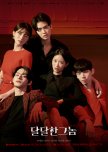
Sinking Your Teeth Into " The Sweet Blood"; Too “Sickly” For Its Own Good?...
Undeniably an intriguing concept, “ The Sweet Blood” did have the potential to be a fairly well-rounded web series with original characters and storyline. However, this series simply becomes its own worst enemy with poor-production value in screenwriting, sets and acting .
The acting quality in " The Sweet Blood" is questionable to say the least. It was not unwatchable per say, however , there were certainly dire line deliverances worryingly throughout the series by the main cast consisting of Chae Yun, Eo Jun and Ji Woong. ( As well as the ridiculous amount of makeup plastered onto Ji Woong’s face in scenes.)
By default, Yeon Seo as a character should have been a well-written female lead. She could have had a profound backstory, a likeable personality as well as having conflicted beliefs as someone stuck between human and supernatural societies. Instead, " The Sweet Blood" reduced Yeon Seo to nothing more than an angst-ridden teenager (rather than a seeming immortal), self-inserted into a formulaic love triangle ( square if you wish to include Do Hyun Je) with lacking character development. Even a potentially intriguing side-storyline (regarding Yeon Seo’s relationship with her mother), was disregarded nearly entirely from the series.
Then there’s our main lead Meo Ru; the foundation of Yeon Seo’s love triangle. Throughout the series, Meo Ru rarely seems to ineffably be unfazed by the supernatural, he is absent-minded enough to put himself in danger countless times for the sake of "plot" (despite Yeon Seo’s warnings ) and seems unable to develop emotionally as a consequence. Even more intriguing elements to his character such as his visions and his actual involvement as " The One" were often half- heartedly thrown in near the ending of the series . (And even then, rarely had an active role.)
Following on from Meo Ru, was Yoon Chi Woo; the second male lead of the series. Yeon Seo’s old flame and a dangerous vampire who seemingly poses both a threat to Meo Ru as well as being "unpredictable", Chi Woo was undeniably an intriguing character. However, his greatest flaw came through his half-baked romance with Yeon Seo.
Despite the constant references towards Yeon Seo and Chi Woo’s " days together", there was no sense of actual significance of this relationship either through flashbacks, memories or accounts by either character. This also contributed to the lackadaisical vampire lore of the web series by the adequate detail with both characters’ backstories also.
Sadly, not even the side characters could make up for this with many side characters being thrown in as " quick fixes "for tension, rather than being entirely necessary for the plot.Do Hyun Je ( Cho Eun Ho), the Vatican’s werewolf ( not even kidding with this one) who ( for reasons unknown to most characters and viewers)seemed to like Yeon Seo. ( Admittedly, there was an arguable reason, but the revelation felt more like a rushed solution to erase the " fourth component for a love square", than actually an intriguing part of his character.) Then there’s Yeon Seo’s best-friend Kim Su Jeong ( Yoon Da Young) who is oblivious for a major part of the series to the supernatural, is dragged ineffably into supernatural scenarios for plot development and her later reactions are just lazily-written .
Adding to this, the seeming " threat" of Yeon Seo’s father as a "big bad" near the end of the series, should have been a decisive story moment , but instead, was anticlimactic and lacked development. ( Despite his intriguing paternal bond by blood *no pun intended* with Yeon Seo.) The ending wasn’t bad per say, but it was obviously a quick and thrown-in solution without any sense of completion or at least a cliffhanger to finally wrap up the web series .
So, what’s the best way to describe this web series and is it actually worth watching ? This entirely depends what you’re looking for in a web series. A quick binge-watch for something which is trope-filled and a time saver from a 16-hour drama? Then, yes. A well-written, original web series with good acting and casting decisions alongside an engaging OST? Then, it is advisable to look elsewhere because " The Sweet Blood" isn’t it.
Was this review helpful to you?
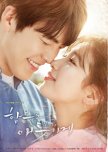
A Problematic Tearjerker...
If you ask for a drama watcher’s recommendations of “ saddest dramas they’ve ever seen”, it is probably likely that you’ll hear or see “ Uncontrollably Fond” ranked somewhere on that list.The series focuses upon successful superstar Sin Joon Young ( Kim Woo Bin) who awkwardly meets his old flame from his youth, No Eul ( Bae Suzy), a producer of documentaries. When their respected careers awkwardly make their paths cross once again, No Eul is surprised to learn how much Joon Young has changed into a shallow and materialistic individual, rather than the kind-hearted person she once fell in love with, however, Joon Young also begins to stumble upon a life-changing truth which may finally ruin his relationship with his former love...
Undeniably, Uncontrollably Fond isn’t the type of drama to watch if you’re looking for something” fun and fluffy” ; the focal point of the series centralises upon terminal illness, tragic love and angst with Lee Kyung Hee’s ( The Innocent Man, Chocolate) screenwriting hoping to tug at heartstrings of viewers , rather than relish in a sweet romance tale (as shown in his more light-hearted works). The show is certainly effective within inflicting heartache onto viewers towards the particular fate of our characters, however, it is still certainly problematic when it comes to characterisation, as well as clearing up the evident inconsistencies which arose in this angst-ridden ride as well.It is important to note that the acting in the show is certainly quite good. Kim Woo Bin and Bae Suzy are undeniably brilliant actors, however, it is fair to say that their characters are tackled interestingly, to say the least.
Bae Suzy’s character, No Eul is undeniably a kind-hearted soul who is passionate about her work and desperately tries to make amends with Joon Young over the course of the series . On the other hand, No Eul often felt too dormant within her actual role and presence as a fleshed-out individual onscreen. Whilst it is important to stress that a show doesn’t necessarily need to go into a whole life story upon a character in order for viewers to “ get to know them personally”, it’s hard to really distinguish or get a grip upon No Eul as a character outside of her “ necessary flashbacks “ and past relationship with Joon Young. Even minor details such as her interests, interactions outside of her workplace and reactions to prominent obstacles over the course of the story , often felt passive and lacking in emotional depth to truly portray her as a well-written female lead.
Then of course there is Kim Woo Bin’s role as Joon Young. Undeniably Joon Young goes through several terrible ordeals even before the main events of the series, which fundamentally shapes his certain outlook upon life, relationships and characters (No Eul, being the evident subject of Joon Young’s changed interactions and feelings). No Eul’s entry into Joon Young’s life again comes nearly simultaneously with his life-changing news. This consequently causes him to try pushing No Eul away, as she becomes his saddening and haunting reminder of a past that he’s tried to reject, and he can never return to.
This of course leads us down two routes of “ problematic” characterisation; the first within Joon Young’s behaviour, and secondly towards this behaviour is inflicted towards the female lead No Eul . It’s important to say that Joon Young’s reactions and attempts to drive No Eul away by flirting with other women, did add a slightly realistic reaction towards the male lead’s scenario. Joon Young is supposed to be only human and naturally intrinsically driven like most people towards rash decision-making.
However, Joon Young’s often anger-driven emotions and reactions towards his situation by throwing things or beginning a screaming match, soon became both frustrating when he began to lash out at times upon No Eul. A lot of fans of Uncontrollably Fond’s pairing often seem to gloss over the fact that ,for the majority of the series, Joon Young was emotionally abusive and physically harassed the female lead upon several occasions ( not least throwing her out of the car in the middle of nowhere, grabbing her arm often without consent and often manipulating her feelings rather than merely being honest).
Again, this is not saying it was “ wrong” for Joon Young to have feelings anger or for the show to touch upon emotional abuse or physical harassment, but it was concerning that the drama neither raised this up prominently as a terrible issue or relationships, and suddenly tried to “ sweeten” this by Joon Young and No Eul’s more “ romantic” feelings before the finale. This sudden transition from Joon Young tossing No Eul out of a car to hugging her several episodes later, wasn’t just nonsensical, but ridiculous in terms of character and relationship progression.Nevertheless, despite the questionable relationship between the two characters, the finale did leave a sucker- punch for viewers’ feelings. Without spoiling too much, it is fair to say that upon reflection the ending isn’t “ sad” per say because of the fate of our characters, but rather the blinded acceptance towards what is happening in their present, rather than their pasts or futures.
Overall Uncontrollably Fond wasn’t a bad show with some well-written qualities of the psychological complexity of coming to grasps with terminal illness, relationships, love and an emotional ending. On the other hand, Uncontrollably Fond had little greater character depth, straying away from cliches and explanations ( not least the “ unexplained illness”) ,a healthily progressive portrayal of relationships and problems of sugarcoating issues of emotional abuse and physical harassment within the main couple as well. As a drama to pass the time and as a tearjerker , Uncontrollably Fond is undeniably a good-binge watch, however, if you’re looking for a show with genuine depth and a well-written relationship between our leads, then look elsewhere because Uncontrollably Fond certainly isn’t the one that you’re looking for.
Was this review helpful to you?

Bloodshed And History ; Where To Begin With One Of The Most Controversial Dramas Of 2021...
Before getting on to analysing the main storyline and characters of the series as individuals , it is probably most prominent to address two main controversies which ultimately affected character and production in the drama. First, dropping initial actor Ji Soo with his allegations in favour of Na In Woo in episode 7 ( subverting On Dal’s personality ) and then having to reshoot scenes eventually with Na In Woo and releasing the earlier episodes after the initial finale . Whilst a lot of diehard advocates of the show will probably sugarcoat this by stating that “ it didn’t stop the storyline from being good” or “ Kim So Hyun made up for this”, it is important to note that even in early episodes, the series did often feel hampered by several incoherent screenwriting choices.A notable example of poor scriptwriting occurs by the usage of contemporary vernacular in the show’s main setting of the Goguryeo era (37BC – 668AD). Although admittedly it would be equally ridiculous for the show to even attempt speaking in an outdated and incomprehensible tongue for the whole course of the series, it felt laughable when a palace guard or a member of the royal court suddenly sprouted demotic Korean phrases that would not be out of place in an Internet cafe in Seoul today. Of course, it is understandable that the drama does want to resonate with modern audiences, and as a fictionalised story, tweaking history can present an interesting depiction of the director and screenwriter’s thoughts. However, instead of actually bothering to take the time to present authenticity through discourse exchanges, some of the spoken lines of the series felt awkwardly mismatched with its time and setting. ( Though admittedly this did improve in later episodes.)
As a consequence, this often took away from the more intriguing portrayal of the historical costumes , and the storyline ‘s main focus on a warring nation torn by clans. The premise is fairly intriguing by its initial setup of the amnesiac heroine Princess Pyeonggang ( Kim So-hyun) defying her fate , falling in love with “the fool” On Dal ( Ji Soo/ Na In Woo) and of course taking its origins from a modern spin on the traditional folktale based on the 2010 novel Princess Pyeonggang (written by Choi Sa-gyu).
Nevertheless, Kim So-Hyun is able to brilliantly capture Pyeonggang ( or “ Ga Jin”) through her individual performance , however, something which should initially be addressed as an example of questionable miscasting, was the choice also to use So-Hyun to play her character’s mother, Queen Yeon during flashbacks in early episodes. ( Leading to a lot of confusion for first-time viewers of the show.)
In addition to this whilst it is hard to fault Kim So Hyun’s performance, her character felt oddly-written. When we are first introduced to Ga Jin she is a ‘’blank slate’’ due to not possessing defining memories of her past. However, the main issue towards Pyeonggang is due to her character development as the story progresses. We were told that Pyeonggang grew up as a top assassin Yeom Ga-jin, which implied that she should not only be skilled in martial arts, but also would be able to be quick-thinking in dire situations. Yet often during key events in the series, Ga Jin/ Pyeonggang was often reckless and foolish. Near the ending, admittedly Pyeonggang did resort back to her resilient and tough role as the heroine, however, the development in between deeply questioned how such a fierce, decisive and brave warrior from the flash-forward during the opening montage matched up with the character who seemed to unfold over the course of the series in front of viewers’ eyes.
This moves us onto the biggest elephant in the room, On Dal. Being played by two different actors, there is the most evident problem of how to assess this character from the two difference performances upon the archetype of the ‘ kind-hearted and foolish male lead’.
Ji Soo seemed to capture the ‘ fool’ as benign and goofy, adding a notably fractious and eccentric undertone to On Dal as a character. However, Na In Woo took a less childish approach to On Dal’s constant grins and confused tone , through dumbstruck expressions for the latter part of the series before taking on a more serious tone towards the character (as he is becomes a more revered individual due to the circumstances ). Regardless, On Dal acts as a major asset within Pyeonggang’s journey of self discovery and their fairly sweet romance tale by bringing out her personality and as a tie to her complicated past. However, the problem still remains not merely by the different performances of On Dal for viewers , but trying to flesh-out On-Dal as a sentient character.
In fact, this was an evident problem between how the show dedicated time to sketching out the drama’s personae , but it’s hard to really “ grasp” or feel intricate emotional attachment towards most of them. The early episodes of the drama enjoyed using the stock side characters of the village as comic relief, before in the second half and the time-skip bringing in a multitude of either newly introduced or previously mentioned antagonists and characters . (Whilst many of these characters and villains were incredibly interesting , they often struggled to have decent screen time in order to develop out of their one-dimensional shell.)
Perhaps the one character in the show who was surprisingly quite intriguing in the beginning of the series was General Go Geon ( Lee Ji Hoon). As it may seem evident through tropes, Go Geon naturally becomes the ‘ second love interest’ through his ‘ complicated’ feelings with Ga-Jin. However, whilst Go Geon did surprisingly possess the potential role as an an intriguingly motivated anti-hero in the series, his role ( without any spoilers) was sadly blanked out due to poor character development.
The ending was predictable to say the least and arguably anticlimactic by straying away from the actual conclusion of the renowned tale. Of course, this is a fictionalised drama and having an artistic license is not inherently wrong. However, the ending may cause a little bit of head scratching for viewers by ( the change of actors for On Dal aside) the entire flashforward , weather and certain events being subverted entirely. In addition to this, the ending felt more like a ” quick-fix”, than being built upon strong foundations by the slow-paced storyline (in parts ) diminishing often the more intriguing elements of the drama.
So, is ” A Moon Where The River Rises” being unfairly criticised, or is it genuinely a good watch? Controversies aside, whilst the aesthetic cinematography, a high-budget production value ( especially remaining apparent with its CGI and beautiful outfits) and Kim So Hyun ’s brilliant performance remained compelling enticements towards watching the drama, ” River Where The Moon Rises" suffered ultimately from whimsical screenwriting. Intriguing characters and villains often felt half-baked, the overused tropes in the first-half of the series often made the second-half struggle to catch-up with the more intriguing elements of the storyline ( resulting in slow-pacing also ) and the ending felt rushed to say the least. Ultimately, ” River Where The Moon Rises” isn’t a dire or terrible drama and certainly does have some redeemable qualities , however, there are better sageuks ( historical dramas) out there with stronger plots, more three-dimensional characters and well-written endings also.
Was this review helpful to you?
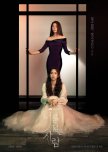
This review may contain spoilers
A Slow Descent Into Hell…
Life is rarely a straightforward and narrow road and for artist Hee Joo (Hyun-Jung Go), her road seems to be an incessant path of bumps, twists and turns as she gradually begins her descent into “ Hell”.
The storyline places emphasis upon unravelling questions towards Hee Joo’s fall from grace.The female lead seems to have all ; she had a rough start but now has two beautiful children, a doting husband, a lovely home, and a successful art career, yet something still seems to haunt the female lead . Yet when a terrible incident happens to her daughter Ri-Sa (Su-an Kim), Hee-Joo is shocked to end up meeting someone she used to know in her past Hae Won (Shin Hyon Bin); a ghost of her former lively-self. Hee Joo and Hae Won’s encounter marks the beginning of a hellish journey that will test and trial everything that Hee-Joo believes she already knows…
Adapted to the small screen by director Im Hyun Wook ( ‘ People You May Know’) and screenwriter Yoo Bo Ra ( ‘ Just Between Lovers’, ‘ Snowy Road’) from Jung So Hyeon’s novel ‘ Someone Who Looks Like You’ , ‘ Reflection Of You’ takes a noticeably darker and bittersweet tone than most melodrama revenge-tales, and a slow-burn plot which will test viewers’ patience spans to the maximum.
Of course this isn’t to say that there isn’t intrigue for viewers surrounding the plot premise or initial start; it wastes no time hooking audiences ( shown as a literal metaphor through the fishing line thrown into water in the first episode) and adds a few little threads to keep the series interesting; the mysterious and unconscious John Doe visited by Hee Joo’s husband who later disappears, the tension between Hee Joo and her affluent , aloof mother-in-law , Hae Won’s use of an alias as well as her evident connection to Hee Joo .
The acting front of the series was admittedly fairly good. Whilst there were a few questionable line deliverances at times it’s undeniable that our main cast really shone throughout . Hyun-Jung Go delivered a brilliant performance as her complicated onscreen persona Hee-Joo whilst Shin Hyon Bin would often steal the limelight as Hae Won ; the chillingly vengeful, enigmatic and mysteriously paradoxical character who acted as the main foil and plot drive throughout ‘ Reflection Of You’.
Yet amongst screenwriter Yoo Bo Ra’s smoke and mirrors tactic through using mysterious subplots and haunting scenes to shield viewers from the actual truth of the past and events to follow, ‘ Reflection Of You’ isn’t without its more evident loose threads either.
The series is undeniably slow-paced. Whilst this is a necessary tactic for keeping the storyline afloat and the input of cliffhangers during most episodes helped the drama to gradually reach its apex , ‘ Reflection of You ‘ could often ward off viewers and potential newcomers. The series would often become bogged down with its arbitrary soap-opera trope-worthy moments, occasional out-of-place transitions and use of over-the-top dialogue and line deliverances. Whilst it does present a form of ( intentional or unintentional ) dramatic irony in the lavish and melodramatic world of ‘ Reflection Of You’, it could often create a sporadic and disjointed plot with many loose plot ends sticking out like a saw thumb by the ending of the series.
The finale of ‘ Reflection Of You’ undeniably divided audiences; a final conclusion towards the twisted world of the series, but leaving a lot of unanswered questions and logic on the sideline with main characters Hae-Won and Hee Joo’s arcs feeling underdeveloped .
So is ‘ Reflection Of You’ actually worth watching or is it a waste of time? ‘ Reflection Of You’ is a drama which will admittedly engage or disengage audiences dependent on expectations. Whilst this is generic situation for a lot of K-dramas, ‘ Reflection Of You’ often finds itself digging its own grave at times by its snail-paced progression and dragging out plot points behind its expiry date . This isn’t to say the series is “ terrible” or “ unwatchable”; the acting is fairly dynamic throughout the series, the plot premise is intriguing and there are some wonderfully-interweaved scenes by director Im Hyun Wook to give viewers goosebumps. However the incompletion of a series which was dragged out for viewers alongside mismatched storyline and plot points, can admittedly lead to some mixed-feelings and uncertainty towards the finished product.
Was this review helpful to you?

Was It Love , Or A Waste of Time?
As Korean romance dramas go, “ Was it Love?” certainly wasn’t one of the worst Korean dramas out there, with some intriguing themes tackled such as motherhood, parentage and abortion as well.What is fair to say, however, is that “ Was it Love?” had so many opportunities throughout the drama to play upon its own cliches of the mysterious father, particularly through Noh Ae-jung ( Song Ji hyo)’s daughter, Ha-nee ( Uhm Chae-young )’s being allowed to bond with her potential fathers in equal manners such as ;
famous actor Ryu Jin ( Song Jong ho), financial head Koo Pa-do ( Kim Moon Joon) , P.E. teacher Oh Yeon-woo ( Koo Ja- Sung) and novelist Oh Dae- Oh ( Son Ho Jun) respectfully throughout the entirety of the show.
Although Song Ji hyo did captivate some of the elements of her character’s determination upon screen at times ( in addition to the scriptwriting ), her acting at times seemed a little wooden and thus didn’t help in making Ae-Jung’s personality seem often very lacklustre.
Of course that’s not to say that Ae- Jung was quintessentially a terrible character as there is no denying that Ae-Jung did seem to share genuine love and affection for both her daughter and her mother Choi Hyang-ja ( Kim Mi Kyung) throughout the drama . On the other hand, “ Was it Love?” ‘s biggest flaw soon became apparent by the scriptwriters’ decision to cram-in as much plot focus upon the aspects of Ae- Jung’s seemingly lingering “chemical” relationships with each of the respected male leads of the drama. Although it was undeniable that most of the actors were fairly brilliant in their respected roles, there were too many cliches which brought lacking emphasis upon characters such as Pa-do ( especially with the whole doppelgänger trope) and Yeon- woo as plot devices , rather than as individuals over the course of the drama.
As a romance drama there isn’t anything entirely wrong with this format, however, in making this decision, there was little actual focus upon Ae- Jung’s development as a character as well upon her familial bond with her daughter.
Although an undeniable driving factor of the series was the actual question of Ha- nee’s biological father and the miscommunication between daughter and mother adding to the final climax , it’s fair to say that the ending revelation could not help but severely highlight and question a lot of Ae-Jung’s decisions.
It’s natural to see what Ae-Jung was trying to do in shielding the truth from Ha- nee; she had raised her for nearly fourteen years a as a single parent and Ha- nee finding out the truth about her father would threaten their relationship a lot. On the other hand what did not seem particularly fair was that it hadn’t crossed Ae- Jung’s mind even when her mother mentioned Ha-nee’s interest in finding out more about her father, to at least sit down and give Ha- nee, the respect and liberty to ask about the matter . This was initially ( regardless of events ) quite a selfish act committed by Ae-Jung , both for Ha-nee as well as her father, who is later revealed to be oblivious to the fact that he even had a daughter in the first place.
This is also what bothered me a little but about Ha-nee’s sudden shift from intrigue and wonder over her father to suddenly acting hostile the minute she actually finds out who he is. Whilst I can understand Ha- nee acting this way to some extent when she learns of some of the events and hardships her mother was put through, it just didn’t add up to Ha-nee’s character by not having a moment of actual intrigue or an attempt to get to know him more affectionately, even once in the show ( without being forced of course). If the plot tropes and cliches weren’t bad enough, the cliche of Ha- nee’s ending is even stranger with little actual necessity or purpose apart from wanting to give viewers a “ happy ending”.
Overall “ Was it Love?” is a perfect example of a “ throwaway drama”; easy to binge- watch without a second thought, but certainly lacking within memorability, characters and plot development as a consequence of cliches and tropes adding little value to the actual drama. Whilst enjoyable with certain comical elements, the show was certainly a waste of time if you’re looking for something to actually invest in.
Was this review helpful to you?
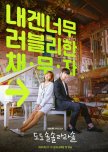
Twinkle, Twinkle But Not A Gem..
The Story; Do Do Sol Sol La La Sol ( roughly translated to ‘ Twinkle, Twinkle Little Star’ from Romanised Korean), tells the story of an affluent girl who is a dreadful pianist, Goo Ra- ra ( Go Ara). When her life hits rock bottom, she ends up running again into the mysteriously hardworking Lee Jae- wook (Sunwoo Joon). Together with Jae- wook and her new friends, Ra- ra might just find the answer to getting her life back on her feet through the kindness of strangers and new love.The Characters; The show offered an odd mix of characters both endearing and lacking characterisation. As our main protagonists go, Ra- Ra was mostly driven as a weeping heroine with little emotional depth. Considering Ra- Ra lost her mother, father and has gone through Hell and Back, there was so much potential for the scriptwriters to induce a level of pity or teaching her character about the realities of life. Instead, any hope for Ra- Ra to be a realistic female lead is thrown out the window in pace of her romance with Jun. Even small actions regarding Ra- Ra by the scriptwriters such as her mysterious multitude of outfits ( and not considering even in the beginning of the show to perhaps sell them to help pay for Jun), the expenses of her hospital fees and her seemingly remaining oblivious to the Doctor and Jun’s secrets, added little to her character. Moving on to our main lead, it’s fair to say that he was perhaps slightly more tolerable for audiences as he seemed to realistically carry emotional burdens upon his back as well as mysterious secrets. Sadly, rather than trying to allow Jun to face his own demons by spending time with Ra- Ra , the scriptwriters tried too hard to add obstacles within their relationship through the strange plot twist near the ending of the show. Whilst this did help for Ra- Ra and Jun to explore their relationship, it seemed just to point out that none of the characters in the show were truly grounded in reality.
Relationships between characters; Perhaps my one appraisal for the show is the Mother- Daughter bond between Jin Sook-kyeong ( Ye Ji- Won) and Jin Ha-yeong ( Shin Eun Woo) . For a show grounded in romance, there was a surprisingly familial turn upon learning that the seemingly daft and flirtatious hair stylist , Jin Sook- kyeong, got a surprising moment of characterisation through learning of her hardships and her actual affection as a single mother for her daughter. Similarly, it was equally sweet that Sook-kyeong, Ha- Yeong and Ra-Ra developed a strong bond between one another as the show progressed. I have a couple of complaints, however, about the need for Sook-kyeong and Ha- yeong to have romantic interests in the show. Whilst there’s obviously nothing wrong with either character having their own love interest, it seemed out of character at times when there could have been more focus upon the characters as individuals. For me, this was seen especially with Ha- yeong. Whilst the scriptwriters dropped the hints, the ending seemed to deny a lot of Ha- yeong’s potential to continue with a successful career.
On other notes, there were other signs of familial love within the show such as Jun and his mother ( Seo Yi Sook) and , the child prodigy, Jae- Min who develops a familial bond with our characters. On a romance level, the show was a bit of a mixed bag. Once Jun’s secrets were exposed it did put a bit of edge for viewers between their relationship, but, perhaps one of the things which didn’t entirely add up for us as viewers, was the revelation towards Ra- Ra not recognising Jun from the past. Whilst it’s natural her memory might’ve been a bit hazy, it seemed a little strange that she didn’t even mildly recognise Jun at the concert hall or at the wedding either. Naturally, there is of course the ‘ second Male lead syndrome’ of the tired Doctor Eun- Seon ( Kim Joo- Hun) . Whilst there were a couple of factors which made Eun- Seon a little more appropriate for Ra- Ra, Eun- Seon came across as a little too forceful of Ra- Ra’s privacy at times, something which struck a nerve with me. The other evident factor was that once Jun swooped in, his “ fanatic feelings” seemed to mysteriously disappear. Whilst the scriptwriters evidently didn’t want to spend hours upon Eun- Seon falling out of love, it was another case and point of bad characterisation that we didn’t get to see Eun- Seon’s reactions as a human being.
Acting; Go Ara struck me as an unusual choice to play a romantic female lead. Typically taking on more gritty or melodramatic styles such as Black and Haechi, it wasn’t that Ara was necessarily bad within playing Ra-Ra, and in fact, exposed herself as an actress by not being typecasted as the action heroine. ( An ironic reversal for most female actresses). On the other hand, to put it simply, , she just didn’t add anything new or illuminating to her role. (Admittedly, this was also the fault of the scriptwriters as well) Moving onto our Male lead, Lee Jae- Wook has really been rising to providence as a romance actor after his appraised role in Extraordinary You. Whilst I wasn’t a great fan of the show, Jae- Wook’s acting did peak my interests as a potentially good actor. It was clear to see that Jae- Wook put his heart and soul into the drama within his role as Jun, however, in a similar manner to Ara, Wook didn’t bring anything new or exciting to his take on the Male lead. (Perhaps a personal thought upon Jae- Wook is that whilst he took the role on within the popular genre of romance, he should explore outwards into different genres in order to explore his boundaries of acting).
OST/ Cinematography ; Whilst the show plays upon classical music and standard panel shots, there was a lot which could’ve been explored with the usage of music and cinematography hand in hand.
Plot thoughts; In all honesty, the actual plot of the drama isn’t terrible. What it certainly isn’t is overwhelmingly impactful, original or intriguing for audiences. The cliches have simply been seen and done before; the sanguine and dippy rich girl who learns life lessons, the hardworking Male lead , illnesses and hidden pasts as well. The biggest fault within playing upon these cliches is that the audiences rarely get to see the characters as human beings, rather than merely plot devices. As a consequence, whilst sugary sweet with a bittersweet ending, the drama was overly unrealistic and easily forgettable for the next Korean Romance Drama succeeding this one. .
Was this review helpful to you?

‘Nevertheless’- The Drama That Failed To Reach Its Full Potential.
It feels as though “ mature” tag romance dramas aren’t often taken seriously in K-dramas, but ‘ Nevertheless’ attempts to present things differently. The webcomic-based drama focuses upon the turbulent relationship between art students Nabi ( Han So Hee) and Jae Uhn ( Song Kang) connected together throughout their infatuation with butterflies. However (controversies aside surrounding the allegation case of actor Kim Min Gwi), whilst ‘ Nevertheless’ soared high at times, the drama could often find itself smacked face into the ground with its own problematic flaws also.
Watching the "relationship" between Nabi and Jae Eon play out is similar to getting stung repeatedly by a swarm of killer bees and then falling in a ditch filled of stinging nettles and vipers. Nabi and Jae Uhn aren’t in an overtly healthy relationship . Nabi is revealed to have been a victim of several abusive relationship in the past, and so projects her anxiety into committing herself again into a long-term relationship by seemingly maintaining only sexual intimacy with Jae Uhn. In the first episode alone, Nabi even admits openly to viewers that ‘I don’t believe in fate or love anymore. But this situation, it’s pretty unrealistic’.( Yet secretly yearns for more .)On the other hand, Jae Uhn’s nature is seemingly “ obscured from view”- one minute he happily pines over Nabi, the next he is chatting another girl up, only to pull out serious red flags when he suddenly appear out of nowhere in front of Nabi to “ save the day” .
Of course this is supposed to be the plot device that keeps the main storyline moving . Jae Eon and Nabi are both flawed people who only bring out the worst in one another. (That’s the point. )However, this is also where the drama failed to utilise this storyline to its full potential also. Director Kim Ga Ram may have seemed to think it was a good idea to bog down 20 minutes of screen-time with brooding eye- exchanges between Nabi and Jae Eon onscreen, but having an episode with only
20-25 minutes of quintessential storyline, 20-25 minutes of moody gazes, saucy scenes and then only a brief checkup on subplots isn’t entirely the best format to follow for every episode . Perhaps it wouldn’t have been so bad if the drama had gradually increased the essential storyline scenes as the series progressed, but soon the drama began to lose a lot of its original intrigue an incessant loop of pretty much the same setup where Nabi or Jae Eon would be lusting over the other, a misunderstanding would occur, they’d ghost one another or make the problem worse ( usually hurting one another or someone else in the process), lengthy scenes of pining gazes would occupy screen time, a cut to one of the subplots and then suddenly Nabi and Jae Eon are on “ reasonable” terms again.
Of course this is nothing to do with the actress behind Nabi .Soo Hee really captivated her role well. The slight uncertainty morphing onto her face and a twitch of her hand with trepidation really helped to animate her onscreen persona to life. However, as a character, Nabi’s was seriously poorly-written . The female lead initially starts off the drama as a sympathetic female lead; we are made aware of her experiences early on, and can see how she is falling hook, line and sinker again into a toxic relationship with Jae Eon as she even voices her own awareness that ‘It feels like something new is about to begin. I’m probably not mistaken’. Although where Nabi ultimately failed as a character wasn’t inherently to do with her conflicted feelings between Jae Eon and the softer option with Doo Hyuk ( Chae Jong Hyeop), but her self-depreciation and lack of self-respect as an individual . Yes, Nabi is a victim of abuse and we cannot forget that. However, it is a really irksome fallacy by screenwriters and writers that someone in Nabi’s vulnerable position” can somehow be fixed from years of emotional trauma by being in a " committed relationship ”. Nabi ( at the end of the day) had serious emotional and psychological issues which needed time and healing, not implicating her in order to keep a poorly enforced plot device working .
This isn’t to entirely drag and degrade the series down. The OST was pretty good, and Ga Ram’s cinematography was really mesmerising also. Two memorable scenes of the drama came through how director Kim Ga Ram inter-played lighting and symbolism here subtly- Jae Uhn in the room of butterflies with the door ajar yet all of them trapped with him, and then the open freedom of the meadow with Doo Hyuk and Nabi sat together enjoying the natural world overtly. The creative juices can only run so far into a series, however, before the problems soon dry them up. For example whilst Song Kang is a good actor, he didn’t feel entirely right as Jae Eon . He did certainly captivate the charismatic ambience of the main male lead , but he was honestly a little lacklustre by rarely radiating prominent vitality as his onscreen Casanova persona.
Of course the subplot characters were fairly intriguing in their own right - cool-headed and punk aesthetically adorned Oh Bit Na ( Yang Hye Ji), a good friend of Nabi, and the taciturn Nam Kyu Hyun had a constant “ will they, won’t they?” dynamic to their relationship. However with the controversial scandal surrounding Min Gwi, the producers made a quick and prompt decision to entirely cut out Kyu Hyun and Bit Na’s relationship scenes( as much as possible) during the last few episodes.Effectively this had a detrimental impact upon an important side couple’s development. However, this problem was also found with Sol ( Lee Ho-Jung) and Sol’s repressed feelings towards her blatantly oblivious best friend Seo Ji Wan ( Yoon Seo Ah) ‘s lacking screen time was diminished even further by the focus on the teachers and their” chemistry” in order to make up for lost screen time between Kyu Hyun and Bit Na.It wasn’t bad per say this couple being focused upon , but there were a myriad of variable storylines which were poorly sketched-out or abandoned throughout the drama which could’ve been explored instead such as the mysterious man that Yoon Soo bumped into, exploring Sol’s sexuality and feelings in more detail ( as well as her possible reasons for liking an unlikely person like Ji Wan), Jae Eon’s interactions with his family possibly providing further indicators into his current mind-frame , exploring Bit Na’s friendships as well as her experiences with trauma and even Jae Eon’s -ex’s story were all beyond wasted potential. The ending only provided this as case and point by failing to tie off loose ends as well as justify Nabi’s chance to heal and gain self respect.
So, is ‘ Nevertheless ’ actually worth watching? The delivered result of ‘ Nevertheless’ will ultimately vary for a lot of drama fans. Many will likely praise the more explorative and daring promiscuous themes in the drama, as well as the art house-style cinematography, the alternative OST and most of the cast. However, it is easy to see where ‘ Nevertheless’ also fails to reach the mark ; the pacing was off even at the best of times, the turbulent relationships ( including the side couples ) rarely met their full-potential and the main characters weren’t given enough opportunities to escape their one-dimensional shells as plot devices. Certainly not a cataclysmic drama, but sadly failing to reach its full potential also.
Was this review helpful to you?

Soundtrack #1; A Discordant Love Story…
The recent venture of juggernaut industry company Disney into the world of K-dramas has marked an onslaught of mixed reception from viewers and critics alike. Nevertheless with a recent investment by the international streaming service Disney+ into copartnership and copyright deals with South-Korean producers and companies, it is hard to ingore the recent presence of Disney within the world of K-dramas. Indeed, the latest series to come out in selected countries from the streaming service, ‘ Soundtrack #1’, is no exception. A stipulated love story between two friends, ‘ Soundtrack #1’ is a short and benign romance drama which while bittersweet in parts, could often feel contrived by its setup and characters.The narrative of ‘ Soundtrack#1’ focuses upon two close friends. Lee Eun Soo ( Han So-Hee- ‘ The World Of The Married’, ‘ Nevertheless’ and ‘ My Name’, ) is an aspiring lyricist. Nevertheless despite having the ability to pursue her dream job, Eun Soo is struggling to find a source of inspiration and has hit a difficult period of writer’s block.
Thankfully Eun Soo has found comfort and support by relying upon her friend and photographer Han Sun Woo ( ZE:A’s Park Hyung Sik-‘ The Heirs’, ‘ Strong Girl Bong Soon’ and ‘ Happiness’). However as Eun Soo and Sun Woo attempt to navigate their current relationship, it becomes apparent that romantic feelings between friends aren’t always so easy to navigate.
‘ Soundtrack #1’ came together as the byproduct of screenwriter Chae Yoon (‘ She Would Never Know’) and director Kim Hee-Won ( ‘ Fiery Priest’, ‘ Vincenzo’ and upcoming series ‘Little Women’). While Hee-Won was certainly not treading upon unfamiliar ground with the romantic melodrama ‘ Soundtrack #1’, it certainly seemed an intriguing choice to pair up Hee-Won, a director known famously in recent years for her witty slapstick comedy-style and revenge dramas, with screenwriter Chae Yoon, who is associated with the lighthearted romance series ‘ She Would Never Know’ for ‘ Soundtrack #1’. Nevertheless despite the eccentric pairing choice, it is arguable that the contrasting idiosyncratic styles between screenwriter and director helped to bring a certain flair to the miniseries.
Perhaps it is important to establish that ‘ Soundtrack #1’ doesn’t push boundaries within its initial setups and plot premise. It is a basic and conventional romance story. In particular it was evident to see the influences of screenwriter Chae Yoon within ‘ Soundtrack #1’. The similar rhetoric of the male lead attempting to escape the friend-zone with his lifelong friend and crush, convoluted feelings developing between close friends and of course repressed feelings causing complications along the way were certainly similar to Yoon’s previous screenplay .
Nevertheless it is hard to deny that despite the lighthearted angst of ‘ Soundtrack #1’, there was a distinctive trait of interminable melancholiness and yearning within ‘ Soundtrack #1’. Director Hee Won’s classic touch of internal and external conflict have become reoccurring themes throughout several of her projects. Although ‘ Soundtrack #1’ may not possess a tale about a character with an eventful past or a personal vendetta, it certainly did highlight the complications that can arise within feelings, careers and between contrasting elites . ( For example Sun Woo’s internal disillusionment and fixation upon his work and coveted feelings for the female lead helped to perfectly contrast Han So-Hee’s external struggles and uncertainty as a songwriter.)
Then of course there’s the discussion surrounding casting choices. Han So-Hee has admittedly triggered mixed-responses amongst viewers and critics alike for her initial performance as main female lead Eun Soo. The actress’ previous career trajectory has seen her star in a mixture of different genres and styles with her recent performance( at the time of writing) in the revenge-thriller ‘ My Name’ being widely praised.
Nevertheless it is hard to deny that despite Han So-Hee’s talents within certain roles and genres , i her performance within ‘ Soundtrack #1’ could often feel somewhat lacklustre with line deliverances and emotional intonations initially. So Hee’s performance did admittedly improve somewhat in the latter-half of the miniseries with a level of heartache being conveyed within her onscreen persona but it is perhaps fair to say that Soo Hee’s performance could feel somewhat lacking at the best of times.
Costarring alongside actress Han So-Hee was ZE:A’s Park Hyung-Sik as main male lead Han Sun Woo. Hyung-Sik has certainly gained a lot of experience within the world of rom-coms and melodramas and this certainly did allow the actor to approach his onscreen role with an easygoing charm. However despite Hyung-Sik’s talents, it is difficult to deny that there were times where the actor could feel somewhat stilted by certain dialogue deliverances .
Then of course there’s the discussion surrounding Hyung-Sik and So-Hee’s potential onscreen chemistry. There was certainly nothing wrong per say with Hyung Sik and Soo Hee’s onscreen dynamic. Although there was an initially inconsistent start , the onscreen chemistry was decent enough. However it is still hard to ignore that while their potential was certainly not unwatchable it rarely felt coherently natural. Perhaps it can be said that these problem boiled down to the flaws of limited screen time . Throughout the duration of the series, an onslaught of variable acting performances by the main cast in addition to the limitations of a restricted time frame rarely helped to allow this onscreen dynamic flow naturally.
Under the directing leadership of Kim Hee-Won, it is clear to see that the four-episode formula and short episode lengths for ‘ Soundtrack #1’ was a double-edged sword.
Of course, it naturally enforced the narrative to be compact and concise within its restricted time frame and duration length. The series was rarely caught up in the trap of being lost down the rabbit hole of an abundance of unnecessary subplots and irrelevant characters. ( Instead these subplots were only briefly touched upon such as So Hee and Sun Woo’s work careers.)
Although there were supporting characters within the series such as Composer Kang Woo Il ( Kim Joo Heon-‘ It’s Okay Not To Be Okay’, ‘ Do Do Sol Sol La La Sol’ and ‘Juvenile Justice’), Sun Woo’s business partner Yoon Dong Hyun ( Yoon Byun Hee- ‘ Love In The Moonlight’, ‘Mr. Sunshine’ and ‘ Vincenzo’) and several surprise guest appearances ( including Yoon Seo Ah, Seo In Guk, Lee Jung Eun, Park Hoon and Park Min Jung), these secondary characters were rarely featured beyond their necessary face value in order to trigger or intensify certain plot events.
On the other hand while a restricted time space did allow the narrative to be more cutthroat with its themes and storyline, it did certainly highlight some specific drawbacks also as a consequence of this compact formula . A limited time frame rarely allowed viewers to see the onscreen relationship between characters being explored beyond their necessity to the plot, hardly allowing opportunities for ‘ Soundtrack #1’ to subvert all of its cliches or experiment with new formulas. Naturally,this could sometimes lead to certain narrative points such as the later development of Eun Soo and Sun Woo’s relationship feeling somewhat rushed.
When it came to filming and production it is certainly noteworthy to point out that Hee Won’s stylistic approach to the series helped to captivate the journey and feelings of characters throughout.
Slick editing and glossy gradients helped to animate scenes to life with specific palettes and tones popping out onscreen. Additionally this helped to differentiate between idealism such as through the eyes of Sun Woo as well as the stark reality presented by Eun Soo throughout the series. ( Perhaps one of the most memorable contrasts can be found in the first episode of ‘ Soundtrack #1’ during Sun Woo’s photo shoot of Eun Soo. Through the literal lens and vision of the male lead, Eun Soo is adorned in a flowing white shirt and smile, giving off an ethereal ambience and air of confidence. In a contrasted scene, viewers are shown reality from the perspective of Eun Soo, adorned in drab clothing and hunched over a computer screen.)
With the title name such as ‘ Soundtrack #1’ it should come as no surprise that the series is heavily invested within using imagery and the OST synchronically. For ‘Soundtrack #1’, this came through an onslaught of schmaltzy and sugary love ballads and solo tracks.
Of course for a series predominantly focused upon young love and relationships, this isn’t an entirely odd choice. However rather than selecting an impressive score for the series or at least choosing songs than could’ve heavily fomented emotional and tear jerking scenes, ‘ Soundtrack #1’ was caught in a slight rut with some of its chosen tracks being unimpressive. Perhaps the few exceptions to this can be found through lovelorn ballad “ Wanna be your lover”[ “이젠 친구에서 연인이 되고 싶어”] by Monday Kiz , LeeHi’s upbeat track “We'll Shine Brighter Than Any Other Stars” [ “우린 어떠한 별보다 빛날 거야”] and Prerettiest One’s acoustic guitar song “ Standing Egg” [“ 너만 예뻐”].
‘ Soundtrack #1’ is a series which does little to diverge away from the expected tropes and basic setups of romance dramas. Although there an were certainly some questionable acting moments at times and the limited time frame for the narrative often led to events feeling rushed, ‘ Soundtrack #1’ was surprisingly able to attain a balance between lighthearted fluff and bittersweet angst. Additionally, the collaborated efforts of Kim Hee-Won and Chae Yoon allowed the narrative to explore an idiosyncratic perspective by both director and screenwriter upon romance and repressed creativity. Although perhaps ‘ Soundtrack #1’ was let down at times by its OST and pacing at times , the four-episode miniseries certainly will offer viewers with a decent and quick binge-watch.
Was this review helpful to you?

You Are My Spring ; The Attempted Reimagining Of Love
Fusion genre dramas aren’t unheard of in K-dramas, but ‘ You Are My Spring’ certainly pulls out a new record with the amount of genres in tried to cram into the show. Does it work? On certain grounds ‘ You Are My Spring’ is partially poetic and partially natural speech at times . The dialogue infused by screenwriter Lee Min Na is a rare example in a K-drama for each individual character -feeling natural because it flows out of the mouths of these characters coherently .
Of course this drama wouldn’t be complete without its star-studded cast. Whilst admittedly there were few eyebrow raising moments of acting in parts of the show, our main cast did add their own dynamic charm to their onscreen personas. Actress Seo Hye Jin plays bubbly hotel manager Da Jung. A talented businesswoman and a person with a heart of gold, Da Jung had a rough upbringing and believes her love life has forever been tarnished by her mother. Da Jung immediately has a likeable charm for viewers even from her initial introduction -she isn’t the cliched “ ditsy and innocent ” female lead archetype, but still often finds herself at the crossroads during problematic moments in the drama. Similarly she’s career-orientated and a hard worker but is often fairly relaxed and kind-natured. However whilst it is understandable that whilst we do see her struggles flare up during “ necessary” moments for the storyline, this was often used as a carte blanche by the screenwriter to “ intensify drama” in order to keep the plot moving, or kindle “ potential chemistry” between the main characters rather than explore Da Jung’s sentience in more depth . There was so much potential to understand more about how Da Jung tried to cope with years of trauma in daily situations, her relationship (in more depth) with her mother, her past relationships as well as how this impacted Da Jung’s social experiences during childhood and growing up also.
On a more praiseworthy note and before commenting on the rest of the main cast, it is important to commend the cinematography and symbolism in this drama . Director Jung Ji Hyun tangoed a lot with screenwriter Min Na’s storyline points through subtle motifs and shifted lighting in order to explore the drama’s heavy-hitting moments in more detail. Da Jung’s morbid obsession since childhood with Edgar Allen Poe’s “ The Black Cat”acts as a perfect analogy for the mystery of the drama.
Yet back to our main cast it is impossible to forget Hye Jin’s fellow costar Kim Dong Wook who played main lead Yeong-Do. Kim Dong Wook added a refreshingly calm presence to our main lead. As his onscreen persona Yeong Do is very much written in the role as the “ nice guy” trope- he’s flawed and has his own emotional scars, but is amiable and possesses a good heart. A psychiatrist who significantly cares for all of his patients, it is fair to say that it was surprisingly heartwarming to see Yeong Do confront his patients or people who come to his clinic in different ways and through small, yet meaningful words and interactions. On a more nuanced note Yeong Do was very much in the same boat as Da Jung.A likeable and sweet character, but a lot of unexplored territory with his development beneath the service . Without giving any major spoilers, it’s fair to say that there was a lot of potential to explore regarding Yeong Do’s childhood. His complicated with his father was often dismissed or skipped over rarely giving opportunities to understand more about his childhood, the impact of his childhood on truly shaping the person he was during the events of the series and of course his exact reasons for becoming a psychiatrist in the first place. Whilst it is arguable a lot of his motives for becoming a psychiatrist were arguably sparked as a consequence of the dramatic events of his past , there was surprisingly little mention or reasoning even during heartfelt talks with Da Jung to back this up.
This naturally moves us onto the potential romantic relationship between Da Jung and Yeong Do . Whilst there are some undeniable qualms with the written relationship between their characters, it is undeniably that respected actors Hye Jin and Dong Wook really worked well together with their onscreen chemistry. They undeniably added vital life to their onscreen personas’ feelings for one another and watching this growth from blossoming acceptance to something more was quite heartwarming. However it is important to be forthright by explaining that this relationship was also the drama’s hamartia.
Refreshingly , it wasn’t necessarily a problem that this potential paring was “ toxic” or “ unhealthy” by either characters’ implicated actions. Both characters made flawed mistakes and misunderstandings within this relationship, yes. However both character were also able to accept and move on from their mistakes or fallbacks- Da Jung could learn to lean on Yeong Do rather than bottle up her emotions, whilst both Da Jung and Yeong Do learnt to give one another distance and time to heal after a particularly severe incident without relentlessly hounding the other. It was honestly a fairly overt relationship. On the other hand it is quickly apparent to see where viewers can grow lost within its labyrinthine plot- a romance story which suddenly turns to a murder mystery, and then back to a slow-burn love story with dominating screen time after the halfway is undeniably off putting for viewers expecting thrill and hype . Adding to this issue was of course the myriads of cliches and tropes which began popping up in the romantic side of the drama- so lacklustre and predictable from other aspects of the uncertainty of the thriller and mystery elements of drama, that sometimes the skip button could never look so appealing.
Of course it is important not to forget the talents of “ second main lead” Yoon Park who added a layer of depth and brilliance to his dual performance as Ian Chase/ Chul. The storyline surrounding the mysterious Ian Chase ( Yoon Park) and his uncanny resemblance to Chul ( also played by Park) was a major source of intrigue throughout the drama, and whilst this storyline certainly didn’t disappoint as later revelations came to light , there were moments which often fell flatline at times because the show was often being pulled apart in so many different directions. Nevertheless did this become more apparent just after the halfway point. Juggling between murder mystery and romance soon saw a higher dedication to the lacklustre slow-burn romance between the main leads- sweet and gradual, but so disconnected and predictable ( including tropes)from the other aspects of the drama that sometimes the skip button could never look so appealing.
Then there’s Ahn Ga Young( Nam Guy Ri). Admittedly there’s a lot more than meets the eye here with Ga Young and rather than sending her down the superficial route as the “ second female lead”, it was intriguing to see this character ‘s growth by her backstory and gradual wholesome friendship with Da Jung. However whilst Gyu Ri is a good actress , the tropes defining other aspects of her character resorted to her being reduced at times as nothing more than a quick plot device to heighten the stakes or comical foil. This was also case and point with our side couples-so cute and bubbly that they often won over the viewers’ attention from a dragging scene between Da Jung and Young Do, but lacking screen time did little to give these couples more limelight in the
second-half also. The ending was as expected-bittersweet in parts, sugary sweet in others but failing to wrap up some more nuanced storyline moments also.
The verdict for ‘ You Are My Spring’ is undeniably that it is dependent on what you want from this drama. At its forefront ‘ You Are My Spring’ delivers good performances by the cast, surprisingly well-written dialogues ,aesthetic cinematography in parts and tries hard to deliver a fusion genre production. Whilst the different genres do help to “ spice up” certain elements of the storyline early on, this idea soon falls flatline when other genres ( particularly the romance) begin to dominate major screen time for evidently more quintessential storyline moments. As a consequence the characters’ development and slow pacing in the storyline soon begins to struggle beneath the surface. The drama often becomes lost in its own labyrinthine complexity-trying its hardest to be an avant garde masterpiece , but often failing to reach the mark in the second-half. Enjoyable but admittedly flawed.
Was this review helpful to you?

A “ Lesson” For Itaewon Class...
Most people will probably tell you that this show is the “ most original Korean drama, they’ve ever seen” or “ the best one ever”, however, there was something about this drama which took me awhile to work out where my problem lay from a critical manner. Of course, there’s no doubt that Itaewon Class has some selling points which were tackled for the appeal of the “ young generation” and “international” viewers. This is particularly seen through; casting choices ( note fairly newcomer actors Da- Mi and American Chris Lyon) , themes tackled( attitudes to racism, LGBT rights and of course released prisoners) , fairly unique plot premise and characters as well . So, where did a show with such brimming potential go wrong? Well, its biggest problem was for once not entirely upon the acting ( this is something which I must give the show some praise for , especially from Da-Mi ‘s emotionally vibrant role as her role character Yi Seo, against lead actor Park Seo Joon’s sometimes lacklustre moments) , but, upon the characters and plot itself. The show ( based upon the titular Korean webtoon) centres around Park Sae-royi ( Park Seo Joon) who during his teen years, was wrongfully imprisoned around the same time of his father’s accident, when he is angered by bully and legitimate heir to Jangga Group, Jang Geun-won ( Ahn Bo Hyun). After being released, Sae- royi claims revenge against Jaanga Group by establishing his own restaurant in Itaewon with the help of fellow misfits , intelligent and tech savvy Jo Yi- Seo as his manager ( Kim Da- Mi), Yi- Seo’s classmate and illegitimate son of the head of Jaanga , Jang Geun-soo ( Kim Dong hee), fellow inmate Choi Seung-kwon ( Ryu Kyung-soo) transgender woman and head cook Ma Hyeon-yi( Lee Joo - Young) and Guinean- Korean part-timer Kim To- Ni ( Chris Lyon). As a premise, the show has a unique flair to it, but, I think it’s quick to become apparent that a show which focused upon the characters as plot devices rather than human beings at times, certainly has lacking emphasis upon characterisation . This cliche grew apparent when the show trickled into the tropes of revenge dramas from illnesses, illegitimate heirs to the stereotypical cliche of love scenarios between the “ older” Male lead Park Sae- royi, the “ young prodigy ,and not so innocent” Yi- Seo , the “ tangled between love and duty” Oh Soo-ah ( Kwon Nara) and the “ puppy -dog outcast” Geun- Soo. Whilst there was nothing entirely wrong with having romance in a drama about misfits, Itaewon Class made the classic mistake of centralising too much focus upon the romance of these characters rather than as individuals with personalities, pasts and lives outside of their relationships . For me, this was particularly seen with Sae- royi. Considering the amount of psychological and emotional damage he’s been through as a character since episode one, you’d expect such a character to be a realistic, cautious and likeable Male lead who is able to relate to viewers through their own painful experiences. Instead, Sae-royi is a perfect example of a “ stock Male lead” who has little emotional outburst, awareness to feelings, manipulation or any moments of weakness which truly make us reflect as viewers upon his journey. Arguably , there’s his “ romance” with Yi- Seo to make him more ‘ human’ ; so lacklustre that it’s a question why it exists in the show at all . Sae-royi seems to constantly mislead this girl with “ obliviousness” only to suddenly be falling in love with her next moment, with little explanation or reasons behind his feelings. Whilst I find it hard to fault Da- Mi, Yi- Seo was a female lead who I absolutely loathed upon so many grounds. I can understand where drama viewers are coming from to an extent by the argument that Yi- Seo is a “ strong and independent female lead”. The show made that evident from nearly episode one when she is able to “make or break “ an establishment’s reputation through her social media account and hold herself in a fight against people using her wit as well. This is also what irked me about Yi- Seo as well. She was a strong character , but she had little emotional depth as an individual. Whilst she did have some scenes which exposed more “ vulnerable moments” , these scenes didn’t truly add up with her “ sassy” characteristics at times or were truly built to expose this side of Yi- Seo without seeming somewhat “ random” and poor writing . Note the scene with the confrontation with her mother early on in the show about chasing an ‘older man’ ( Sae- Royi) rather than following her mother’s hopes for her to become a successful and independent woman. Whilst to an extent the scene explains some of the psychological reasons behind Yi- Seo’s desire to fall in love in order to escape from the planned- out intentions of her mother, there was little emotional bonding or vulnerability both with Yi- Seo and the mother who raised her, or anything truly emotional to expose Yi- Seo as a human being in this scene . Whilst I guess there is the argument of Yi- Seo being a sociopath suggested by several fans by her ability to grow on emotional attachments through her manipulative intelligence, there are scenes later on ( such as Yi- Seo bursting into tears in front of Geun- Won) which question whether this is simply bad character writing , or simply a confusing interpretation for us as watchers . I don’t usually bring in comparisons to my reviews, but, looking at dramas with similar “ strong female leads “ like Jang Man- Wol ( IU) from Hotel Del Luna or Ko Moon Yeong ( Seo Ye- Ji) from Its Okay, Not To Be Okay , brings a stark contrast between “ strong” and “weak “story writing. Love or loathe both dramas, there is the undeniable strength within both shows of a female lead who has emotional emotional depth; exposing these characters not just as “ plot devices for romance”, but, human beings as well with feelings, scarred pasts and flaws as well . Overall Itaewon Class isn’t necessarily a terrible drama, but it the epitome of recent romantic “ fad” shows - mediocre storywriting, poorly-written characters and easily forgettable the minute the watcher starts a new drama. If you’re bored and looking for something to pass the time, I’m certainly not saying that you shouldn’t give it a go , however, this isn’t a drama to watch if your looking for something to genuinely commit time towards.Was this review helpful to you?






















